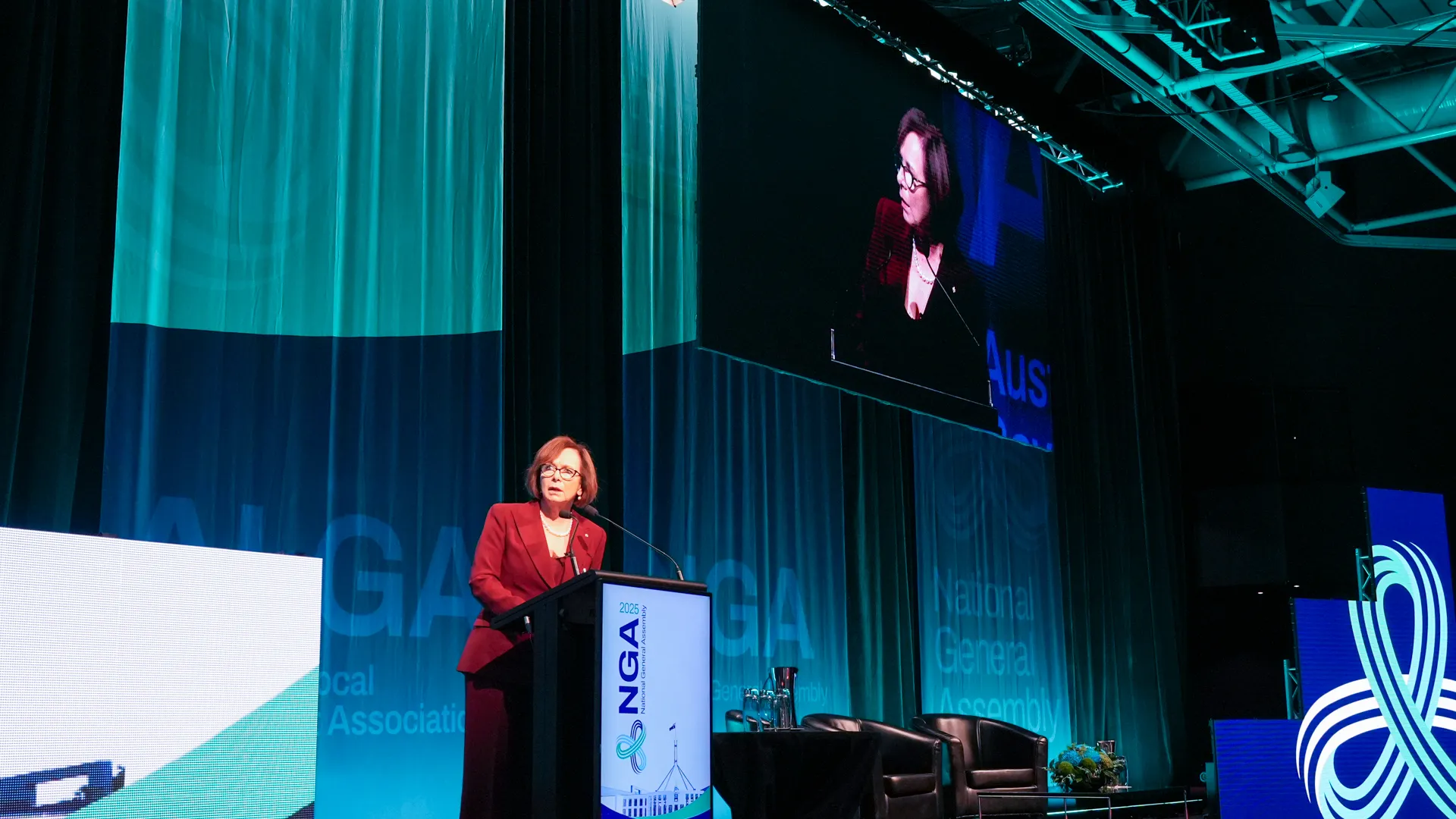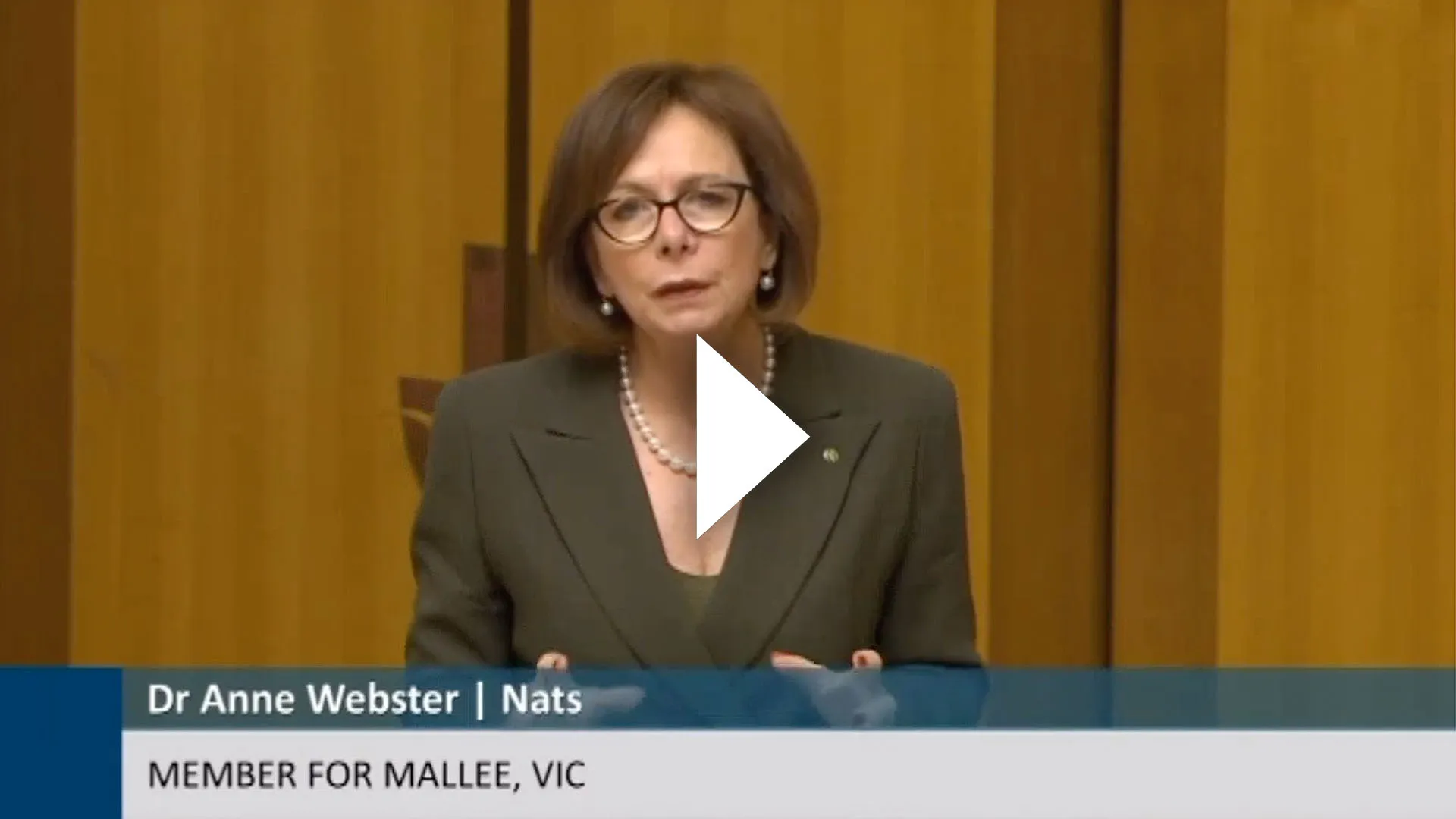Australian Local Government Association

Good morning – it is my absolute pleasure to be here with you representing the Coalition at the Australian Local Government Association National Convention–
I acknowledge in the room today:
the Honourable Kristy McBain MP, Minister for Regional Development, Local Government and Territories, Senator the Honourable James McGrath, Shadow Minister for Urban Infrastructure and Cities and Shadow Special Minister of State, representing the Leader of the Opposition the Honourable Sussan Ley MP, ALGA President Matt Burnett and fellow distinguished guests.
I believe most people who put their hand up for public office such as all of you - mayors, councillors, and my parliamentary colleagues, do so with the ambition to make this world a better place, to make your region and your community, a better place – a safer place. Ours is a high calling, and it has a high cost. Seeking others’ interests and wellbeing first, despite those tired old narratives that suggest our reason for being here is otherwise. Our marriages, our families, our loved ones and ourselves end up making significant sacrifices for the sake of our nation, our electorates, our wards or our communities.
Without a doubt, we live in troubled times. We find the world heading into major conflict, a war in Israel, missiles falling in Tel Aviv and Tehran, and US missile strikes in Iran over the weekend. Not to mention, a war in Ukraine and civil wars in several other countries. It is a sobering moment. How did we get here? After World War II, we thought with a United Nations and a rules-based international order, that we had put horrible conflicts behind us. We thought we valued our fellow human beings more highly.
Our challenge, as community leaders, is to not be overwhelmed, not be dismayed, but to uphold human decency, civil communication and respect in our local contexts. In other countries we see populations voting for – or suffering under – despots, totalitarian regimes, egomaniacs or iron-fisted ideologues. It falls to us, today’s leaders, in the local context, to shape Australian politics to rise above the global affairs dominating our media and to show our communities, our families, and the next generation that here in Australia, we do it differently.
So, here’s my brief, as the federal member for Mallee, with shadow ministerial portfolios of regional development, local government and territories and regional communications
While some city federal MPs have 1 council covering their whole electorate, or covering multiple electorates, Mallee has 12 shires and I shout out to Buloke, Central Goldfields, Gannawarra, Hindmarsh, Horsham, Loddon, Northern Grampians, Mildura, Pyrenees, Swan Hill, West Wimmera and Yarriambiack shire councils. We’ve battled through flooding in Gannawarra and other river Shires, through bushfires in Northern Grampians, Horsham, West Wimmera and Hindmarsh shires – time might prevent me talking about the Disaster Recovery Funding Arrangements, or indeed a different form of disaster, the slow-onset disaster that is drought - which sits outside the DRFA and is causing a lot of grief in my neck of the woods
As I said, I have 12 shires in Mallee, I know my colleague Jamie Chaffey the new MP for Parkes in NSW has 20 shires, we Nationals are lucky like that. One of the facts of regional electorates is that many smaller shires have had to step up, or step in, to run essential services like aged care, home care, childcare because private business models fail in economies of scale, it is just a reality, but local councils know their community needs those services.
Local government voices are so important - and I want you to know that the rural communities I know are making a significant difference finding their voice in critical areas that specifically affect them. Community and neighbourly relations are so important as we face division over energy projects which are railroading regional farming communities driven by federal and state governments with cowboy energy proponents. Perhaps it is happening in your community too?
Just on Friday we learned that the Victorian Government is not interested in consultation on their energy rollout plans. Victorian Labor will impose fines of up to $12,000 on those who will not allow Transmission Company Victoria to come onto their properties because they do not want huge transmission towers or wind turbines on their land. Farmers have been banned by Ministerial Order from making an appeal to the state tribunal VCAT, and cannot request any FOI’s - this is tyrannical behaviour by the Victorian State government: Iron-fisted, and ham-fisted, and stirring huge division in communities where there has been unity for generations. Farming communities feel they have no choice but to become activists when they have plenty of better things to do, such as growing the food and fibre to feed and clothe our nation and the world. Australian governments are cultivating division between city and country, and making our regional communities less stable.
The Australian community and the small rural communities sense of connection is so important in unstable times. When there’s flood, or a bushfire, or a tragedy or something to celebrate, towns and communities come together and are at their best. Long may it be so – whether it’s the tree change community the sea change community, those who told themselves ‘never again’ and moved to the country after lockdowns– they’ve joined new communities for a reason, and effective communication systems are so important. We need reliable communications, which is one of my shadow portfolios, to harness migration into regional Australia – whether it’s working from home, remote work offering the win-win of lifestyle and income, or indeed grappling with this 21st century world where people are glued to their phones consuming entertainment instead of engaging with family, friends and communities.
This is why I am proud to stand before you representing The Nationals, many of whom have been mayors or councillors in regional communities. We fight for regional communities – it is in our DNA – and we unapologetically fought for four strong commitments in the Coalition agreement that will benefit regional Australia:
A Regional Australia Future Fund to deliver around $1 billion per annum to regions for roads, healthcare and other infrastructure projects. On that one, let me just mention Australia exports $650 billion per year and two thirds of that comes from the regions – are we seeing that investment come back? A Regional Australia Future Fund is a step in that direction.
A Universal Service Obligation for telecommunications companies so our coverage in the bush is what we deserve
A big stick called divestiture powers to that the big supermarkets know there are consequences for mistreating farmers, and
Keeping baseload, zero-emissions nuclear energy as an option in our future energy mix.
Regardless of whether you agree with those propositions or not, you’ll find The Nationals are no shrinking violets and so in that spirit I’ve put that all out there. But let me update you on where my eye is fixed as your new Shadow Minister for Local Government.
My first Media Release as your Local Government shadow minister was to call for the Local Government Sustainability federal inquiry of the 47th parliament to resume and finish its work.
The inquiry received 287 submissions and had 15 days of public hearings, including in West Perth, Launceston, Wallan, Cairns and Beaudesert.
If, as Minister King said 14 months ago, the sustainability issues in local government are so pressing – why did the interim report, released in February, have zero recommendations?
I know from talking to some of you that sustainability is the critical issue for you particularly in regional shire councils.
This brings me to another policy issue: the controversial Financial Assistance Grants delivered to State Governments to divide up as they please. As we all know, there are no easy solutions to that problem but we need to work towards finding one. Regional councils get the raw end of that stick every time.
Local Roads and Community Infrastructure – another successful Coalition-era program has been reduced to about one-third of its size, and will be gone altogether under the current government. This was a guaranteed source of funding under the Coalition to fix roads and build community infrastructure. I have heard from you that it was highly valued because it had no co-contribution, it was non-competitive, and it had no KPI’s. You, as councils, actually got to determine the projects for your towns on the basis of your community needs. Who would have thought that the level of government that is closest to the community might know its needs best? Certainly not the boffins in Canberra, or Spring St, or Macquarie St, or William St, or whatever state or territory you come from. If Minister King thought your sustainability was pressing 14 months ago, I know from many of you that you now feel crushed.
Let me throw out there a few other hot topics, and there are plenty more:
Labor’s Energy agenda – in some of your regions there are mining and energy projects threatened by Labor’s current ideological agenda pandering to environmental activists, those skilled in the art of lawfare, and cultural heritage claims that threaten to impose new cost and complexity in the approvals process with more power given to them, than councils themselves hold. In other contexts, you’ve got projects being foisted upon your community whether your shire likes it or not. Perversely, some of the supposed earnings landholders will get from these projects won’t cover the rehabilitation costs at the end of the project, or will be gobbled up by state government taxes and levies.
Let me make my view clear: without social licence there should not be a viable project. Period. Social licence for projects means local support, local benefits, local jobs, in perpetuity. You can see from our Regional Australia Future Fund policy, The Nationals support a social dividend for the reality that two thirds of our $650 billion in Australian annual exports come from the regions. I can confidently say you do not see two thirds of Commonwealth spending occurring back in our regions. We do not have a social licence framework at present because cowboy operators emboldened by Federal and state Labor governments, in many cases, only give lip service to social licence because they know they have Canberra backing them in. Several of my councils are formally taking a stand against their communities being railroaded by government-backed energy projects.
Back on Cultural heritage, let me tell you three quick stories to illustrate from my own electorate:
Lake Tyrrell – we used to have an off-road race called the Mallee Rally (think Finke Desert race). It was around an inland lake, the major annual tourist drawcard for the Sea Lake community. A local farmer spent $1 million building his own small caravan park on his own property on the edge of Lake Tyrrell which council approved. They had to spend thousands consulting with the local indigenous group and cultural heritage was declared and froze it all. It remains frozen to this day, but with no cultural artefacts found by their expert archaeologists.
Salt harvesting - a successful salt harvesting business has for over a generation of blood, sweat and tears taken a government’s industrial by-product – I emphasise – by-product, that is, waste – from the salt interception schemes on the Murray Darling Basin – an environmentally positive project – and turned that waste into a commercially viable product. They invested $millions value-adding on-site – now, native title threatens to shut it all down. This is, mind you, after the NSW government approved the business years before.
Mount Arapiles is a globally famous and stunning rock-climbing site in the Grampians in my electorate. Rock climbers have found and preserved rock art, some of which can’t even be seen with the naked eye anymore. At the behest of the local indigenous corporation, and Parks Vic a government body, two thirds of the rock climbing routes are now being shut to the public over disputed cultural heritage. Let me be clear, people come from all over the world to climb Mt Arapiles, Europeans have bought little houses in Natimuk at the foot of the mountain and moved here but are now told they cannot climb two-thirds of it. Many of my senior shadow ministry colleagues and I signed the Arapiles Declaration to say public land should remain open to the public, all public, while we sensibly preserve certified cultural artifacts. Let’s remember that tourism converted into migration to the area from rock-climbing enthusiasts, many of whom are professionals – including desperately needed medical professionals.
Mount Panorama at Bathurst, many of you know what’s gone on there.
These are serious issues which councils are having to be involved in. What is the public good, as opposed to ideologically driven interest groups, is difficult and uncomfortable, but I urge you to be involved for the sake of your communities and Australia as a whole. This takes courage.
In conclusion, I am all ears! I’m keen to hear what you have to say. I have held this role for 3 weeks, so I am pretty sure I have a lot to catch up on. Let’s talk, through your peak body, there’s 537 of you, at last count, across the local government sector. My commitment is that I will be listening.
There is much work to do, and I am ready to understand the issues and hold the government to account.



